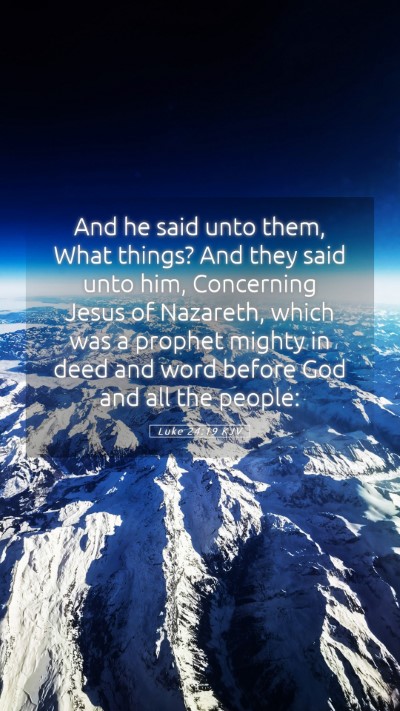Understanding Luke 24:19
Luke 24:19 states: "And He said to them, 'What things?' So they said to Him, 'The things concerning Jesus of Nazareth, who was a prophet mighty in deed and word before God and all the people.'" This verse occurs during the post-resurrection appearance of Jesus to two disciples on the road to Emmaus. In this moment, we find a rich source of Bible verse meanings and Bible verse interpretations.
Contextual Analysis
The context of this Bible verse interpretation is crucial. Following Jesus' crucifixion, His followers were disheartened and confused, grappling with their shattered hopes. The disciples recount the events surrounding Jesus, describing Him as a prophet deemed "mighty in deed and word." This reflects their understanding of Jesus’ role, emphasizing both His miraculous works and profound teachings. According to Matthew Henry, this indicates the elevated esteem the disciples had for Jesus, recognizing His authority in both action and speech.
Insights from Commentaries
- Matthew Henry's Commentary: Henry elucidates that this interaction showcases Jesus' gentle approach, asking questions to draw out their grief and confusion, allowing them to express their thoughts. This laid the groundwork for a deeper revelation of His identity and mission.
- Albert Barnes' Notes: Barnes notes the disciples’ initial misunderstanding of Jesus' resurrection, indicative of their struggle between faith and doubt. He points out that their reference to Jesus as a prophet signifies a limited understanding, as they had not yet recognized Him fully as the Messiah.
- Adam Clarke's Commentary: Clarke discusses the importance of Jesus' query, "What things?", highlighting it as a method for encouraging the disciples to articulate their despair. Such dialogue illustrates how Jesus teaches through inquiry, prompting deeper reflection on His messianic identity.
Thematic Significance
This verse encapsulates several key themes in the broader narrative of the Gospel, particularly the significance of Jesus' teachings and the dynamics of faith in crisis. The explanation of Luke 24:19 reveals the duality of human understanding and divine truth, allowing insights into how we process loss and hope.
Historical Context
Understanding the historical context of Bible verses such as this one enriches our Bible study insights. The disciples were part of a tumultuous period in first-century Judea, grappling with Roman oppression and the transformative message of Jesus. Their confusion wasn’t just theological; it was deeply rooted in their social and political reality.
Application in Daily Life
This verse also poses significant questions for personal application. How to interpret Bible verses like Luke 24:19 invites believers to consider their own struggles with doubt and faith. The way Jesus engages in dialogue demonstrates a model for how we can talk about our turmoil with God and others, leading to deeper understanding and healing.
Conclusion
In summary, Luke 24:19 offers profound insights for personal reflection and Bible study groups. As we unpack its layers, we recognize that the questioning spirit of Christ invites us to fully engage with our faith, struggles, and understanding of Scripture. This approach fosters a path toward Bible study tools that illuminate our faith journey and enhance our comprehension of the miraculous work of Jesus, ultimately unveiling the meaning of Bible verses in our lives.
Cross References
- Luke 24:25-26 - Jesus explains that the Messiah had to suffer and then enter His glory.
- Mark 6:4 - A prophet is not without honor except in his own town, illustrating how Jesus was received.
- John 1:45 - Philip identifies Jesus as the one spoken of by Moses, affirming His prophetic role.
- Acts 3:22-23 - Peter references Moses as a prophet and relates it back to Jesus as the fulfillment.
- Hebrews 1:1-2 - God spoke through prophets in the past, but in these last days has spoken through His Son, positioning Jesus as both prophet and heir.


